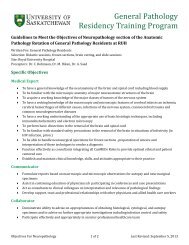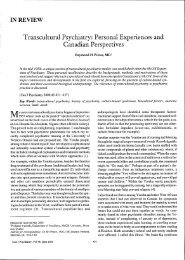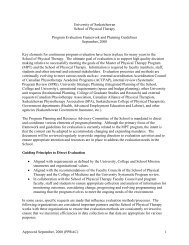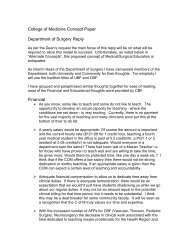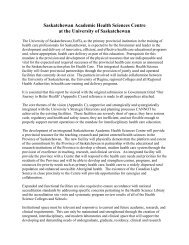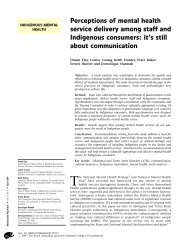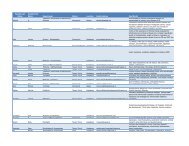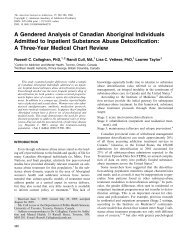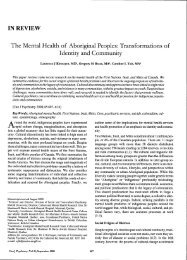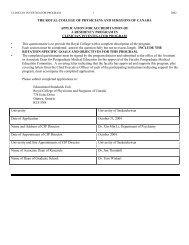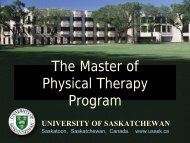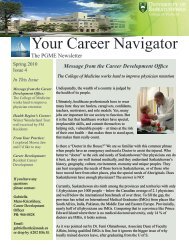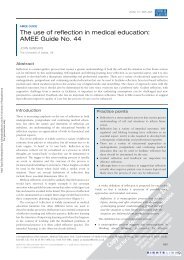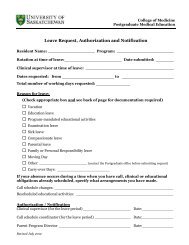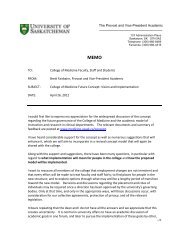COMMUNIQUé - College of Medicine - University of Saskatchewan
COMMUNIQUé - College of Medicine - University of Saskatchewan
COMMUNIQUé - College of Medicine - University of Saskatchewan
Create successful ePaper yourself
Turn your PDF publications into a flip-book with our unique Google optimized e-Paper software.
Over 50% <strong>of</strong> medical students spend time<br />
volunteering at SWITCH.<br />
Making the Links is a multi-site<br />
longitudinal service-learning experience.<br />
Selected medical students participating<br />
in the program spend the summer after<br />
their first year in either the Northern<br />
Métis community <strong>of</strong> Ile a-la-Crosse or on a<br />
reserve nearby Buffalo River Dene Nation.<br />
Students then work at SWITCH during the<br />
school year, and spend six weeks <strong>of</strong> the<br />
following summer in rural Mozambique.<br />
Between these three experiences students<br />
participate in all aspects <strong>of</strong> the CARE<br />
model, and develop an understanding<br />
<strong>of</strong> the commonalities and differences in<br />
three diverse low-resource settings:<br />
rural, remote Aboriginal communities,<br />
an inner-city urban population and rural<br />
Sub-Saharan Africa.<br />
Student Energy in Action for Regina<br />
Community Health (SEARCH) <strong>of</strong>fers<br />
a SWITCH-like interdisciplinary clinic<br />
approach in <strong>Saskatchewan</strong>’s capitol city.<br />
All three projects have arisen as a direct<br />
result <strong>of</strong> student initiatives. Students have<br />
long clamored for more service-learning<br />
experiences, for meaningful interaction and<br />
education regarding health issues <strong>of</strong> the<br />
underserved. Above all, through in-depth<br />
service-learning activity, students gain<br />
experiential understanding <strong>of</strong> the crucial<br />
importance <strong>of</strong> the social determinants<br />
<strong>of</strong> health. These experiences provide the<br />
powerful opportunity for mutual change…<br />
in the learner, his or her teachers and<br />
the community themselves, bringing to<br />
life the fundamental elements <strong>of</strong> social<br />
accountability.<br />
The plethora <strong>of</strong> initiatives demonstrates<br />
the diversity <strong>of</strong> areas, interests and multidisciplinary<br />
collaboration that social<br />
accountability encompasses. The recent<br />
expansion <strong>of</strong> these groups reflects a culture<br />
<strong>of</strong> “civic pr<strong>of</strong>essionalism” among medical<br />
students, where their scope <strong>of</strong> medicine<br />
has broadened beyond the individual<br />
obligation to the patient to the collective<br />
obligation to local and global communities.<br />
Students informally interviewed about the<br />
proliferation <strong>of</strong> student activity suggest<br />
that changes in admissions processes and<br />
grading that emphasize life experience<br />
and communication skills have changed<br />
the makeup <strong>of</strong> the student body. They<br />
also referred to a sense that advocating for<br />
social accountability is not only acceptable<br />
at the <strong>College</strong> but expected. The level<br />
<strong>of</strong> energy, enthusiasm and passion in<br />
undertaking these initiatives embodies the<br />
need to “remind ourselves that medical<br />
education is fun - and we should avoid<br />
taking ourselves overly seriously if we want<br />
to effect practical change.” n<br />
“<br />
Reflecting on my<br />
educational experience at<br />
the <strong>College</strong> <strong>of</strong> <strong>Medicine</strong>,<br />
Making the Links was by<br />
far the most influential,<br />
challenging and<br />
rewarding experience<br />
<strong>of</strong> medical school. The<br />
importance <strong>of</strong> serving the<br />
underserved, community<br />
engagement and<br />
development, and servicelearning,<br />
reinforced by<br />
the Mtl program, guided<br />
me into a rural family<br />
medicine residency<br />
and on to a practice in<br />
Northern <strong>Saskatchewan</strong><br />
with a continued interest<br />
in Global Health. It is<br />
important to me to stay<br />
interested, engaged and<br />
excited in this career<br />
and I am so grateful to<br />
have observed successful<br />
teachers, with such strong<br />
community ties, who<br />
exemplify the rewards<br />
<strong>of</strong> social accountability<br />
in practice.<br />
”<br />
– former Making the Links<br />
participant Dr. Breanna<br />
Davis, MD, CCFP, July, 2010<br />
<strong>University</strong> <strong>of</strong> <strong>Saskatchewan</strong> • <strong>College</strong> <strong>of</strong> <strong>Medicine</strong> C O M M U N I Q U É 5



